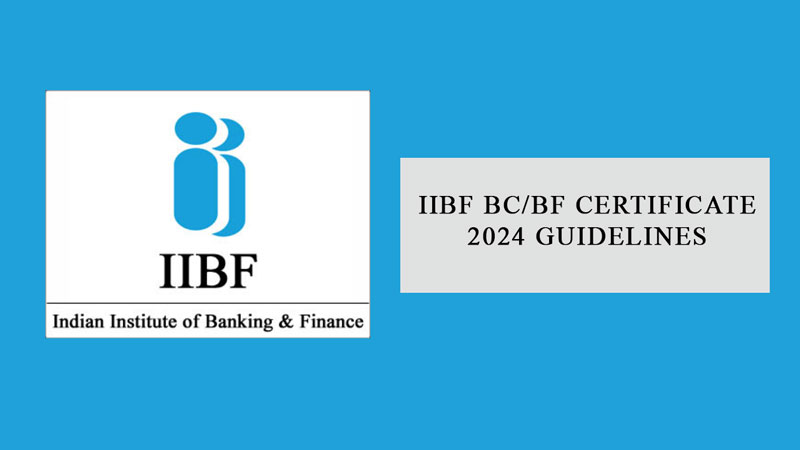The Indian Institute of Banking & Finance (IIBF) introduced a new process for the IIBF BC/BF Certification in April 2024. These fresh guidelines were formulated by the Indian Institute of Banking and Finance in accordance with the directives and regulations set forth by the Reserve Bank of India (RBI). Previously, individuals with a minimum high school qualification were permitted to take part in the offline IIBC BC/BF certification exams. However, the new guidelines have ushered in significant changes in the registration, examination, and certification processes.
Under the revised procedures, prospective candidates must adhere to a more stringent set of criteria for eligibility. Additionally, the examination format and syllabus may have been updated to reflect evolving industry standards and regulatory requirements. These changes are aimed at ensuring that individuals who obtain the IIBF BC/BF Certification possess a comprehensive understanding of banking and financial principles, in line with the expectations of regulatory authorities and industry stakeholders.
Furthermore, the certification process may now involve additional steps or assessments to evaluate candidates’ proficiency and competence in areas relevant to banking and financial services. This could include practical simulations, case studies, or specialized modules tailored to specific sectors within the financial industry.
Now, applicants can apply only through authorized aggregators listed on the official website of the IIBF, which include:
- Bankers Institute of Rural Development (BIRD)
- National Institute for Entrepreneurship and Small Business Development (NIESBUD)
- Ministry of Skill Development and Entrepreneurship (MoSDE)
- Indian Institute of Bank Management (IIBM)
- Private and Public sector banks
As per the new guidelines, the new process of IIBF BC/BF Certification includes:
- Online or offline Registration
- 24-48 hours training (available online & offline)
- Registration for the examination
- Appearing in the exam (available in online & offline mode both).
Examination & registration fees:
Both online and offline modes are available for IIBF BC/BF certification registration, and only applicants who have attended and participated in the training can appear in the examination. The charges may vary slightly depending on the aggregator. For example, the Indian Institute of Bank Management (IIBM) has disclosed the charges as listed below:
- Basic Certification Online Mode – Rs. 1800+GST
- Basic Certification Offline Mode – Rs. 2700+GST
- Advanced Certification Online Mode – Rs. 2700+GST
- Advanced Certification Offline mode – Rs. 4000+GST
Training Duration:
- Basic Certification – 28 hours training (Can take 4 to 15 working days)
- Advanced Certification – 42-48 hours training (Can take 6 to 21 working days)
Business Correspondents (BC) Agent certification is necessary if you wish to register for Common Service Center (CSC) DigiPay or any other bank aggregator’s banking and insurance services, or if you intend to open a Customer Service Point (CSP) or Bank Mitra through the Public Private Partnership (PPP) model. The training program is designed to provide knowledge, awareness, and education related to banking services.
Previously, the cost for registration and appearing in the examination for the IIBF BC/BF certification was less than Rs 1200, but it has now doubled. This adjustment by the IIBF is in accordance with the guidelines of the RBI, aiming to reduce banking scams and educate people about the basic banking services they offer to the general public through Common Service Centers (CSC), Customer Service Points (CSP), Bank Mini Branches, or as Bank Mitras.
Conclusion & Review:
The implementation of the new guidelines for the IIBF BC/BF Certification process has garnered attention, particularly regarding its implications for individuals already holding advanced degrees in accounting, banking, and finance in India. It’s worth noting that a significant portion of the population has pursued undergraduate (UG), postgraduate (PG), diploma, and even doctoral (PhD) qualifications in these fields. However, the new certification framework does not offer any concessions or exemptions for individuals with such extensive educational backgrounds.
This aspect raises concerns about the inclusivity and relevance of the certification process. While the minimum educational qualifications required are only up to the 10th class level, many professionals with higher qualifications may find themselves facing redundant or repetitive training and examination requirements. This lack of flexibility could deter experienced professionals from participating in the certification program, despite their extensive knowledge and expertise in the field.
Furthermore, it highlights the need for a more nuanced approach to certification and credentialing in the banking and finance sector. Rather than solely focusing on minimum educational qualifications, the certification process should recognize and accommodate the diverse educational backgrounds and skill levels of individuals within the industry. This could involve incorporating mechanisms for assessing prior learning and experience, allowing for advanced placement or exemptions based on demonstrated proficiency.
In conclusion, while the new guidelines for the IIBF BC/BF Certification aim to enhance the quality and integrity of banking and finance professionals, they may inadvertently overlook the qualifications and expertise of individuals with higher educational credentials. Moving forward, there is a pressing need to reassess and refine the certification process to ensure it remains relevant and accessible to all stakeholders in the industry.


